|
Marco Polo
Authors: Daniele Tascini, Simone Luciani
Publisher: 999 Games/Hans im Glück
Year: 2015
review by

| x |
|
|
|
|
|
|
|
|
|
|
|
|
|
|
|
|
|
|
|
|
|
|
|
|
|
|
|
|
|
|
|
|
|
|
|
|
|
|
|
|
|
|
|
|
|
|
|
|
|
|
|
|
|
|
|
|
|
|
|
|
|
|
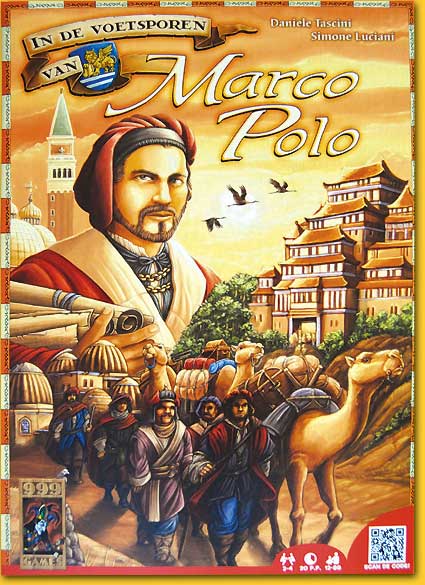 |
We’re travelling the Orient with Marco Polo. We roam exotic cities, visit oriental markets and fulfil contracts. Despite all the camels, gold, pepper and silk, we are actually mainly hunting for victory points.
Each round the players throw their five dice, and place them on their player board. In his turn, a player may place one of his dice on the board. Some locations require two or even three dice. When all players have placed all their dice, the round is over. The game lasts five rounds, and that’s all we get! |
|
|
|
| x |
|
|
|
|
|
|
|
|
|
|
|
|
|
|
|
|
|
|
|
|
|
|
|
|
|
|
|
|
|
|
|
|
|
|
|
|
|
|
|
|
|
|
|
|
|
|
|
|
|
|
|
|
|
|
|
|
|
|
|
|
|
|
| Every location depicts the number of dice that have to be placed. The number on the die usually determines the ‘strength’ of the action: by placing a ‘2’ in the camel-department of the market, a player may collect two camels. But if he places a ‘6’, he takes six camels! On the positions that require more than one die, the lowest-numbered die determines the strength of the action. After performing the action, the dice remain on the board. If another player wants to perform that same action, he is very welcome to do so, but he’ll have to pay for it! He pays an amount of coins equal to the number on his own (lowest) die. Luckily, there’s also a location to obtain money… |
|
|
|
| x |
|
|
|
|
|
|
|
|
|
|
|
|
|
|
|
|
|
|
|
|
|
|
|
|
|
|
|
|
|
|
|
|
|
|
|
|
|
|
|
|
|
|
|
|
|
|
|
|
|
|
|
|
|
|
|
|
|
|
|
|
|
|
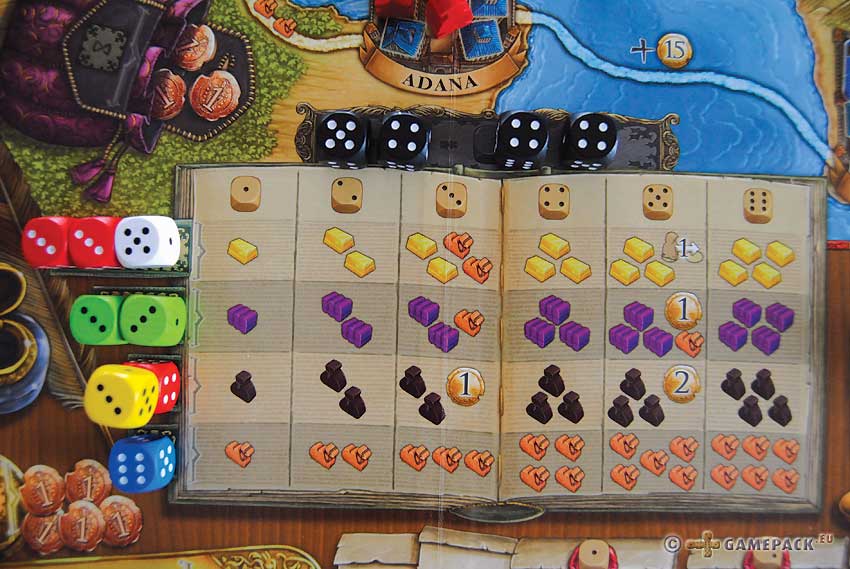 |
| x |
|
|
|
|
|
|
|
|
|
|
|
|
|
|
|
|
|
|
|
|
|
|
|
|
|
|
|
|
|
|
|
|
|
|
|
|
|
|
|
|
|
|
|
|
|
|
|
|
|
|
|
|
|
|
|
|
|
|
|
|
|
|
|
There are various locations where gold, silk, pepper and camels can be obtained. Additionally, players can obtain contracts. Each round six new contracts are placed face up on the board. A player who places a ‘2’ on this location can choose between the first two contracts; if you place a six, you can choose any of the six contracts. Players are even allowed to take two contracts, provided that they have space for them. The player board has room for exactly two contracts. The contracts show the demanded goods and camels; any time on his turn, a player can decide to deliver these goods and therewith fulfil the contract. He then receives the reward: victory points, and often also camels, goods or money. The fulfilled contract is placed face-down in front of him; at the end of the game, the player with the most fulfilled contracts receives a bonus.
|
|
|
|
| x |
|
|
|
|
|
|
|
|
|
|
|
|
|
|
|
|
|
|
|
|
|
|
|
|
|
|
|
|
|
|
|
|
|
|
|
|
|
|
|
|
|
|
|
|
|
|
|
|
|
|
|
|
|
|
|
|
|
|
|
|
|
|
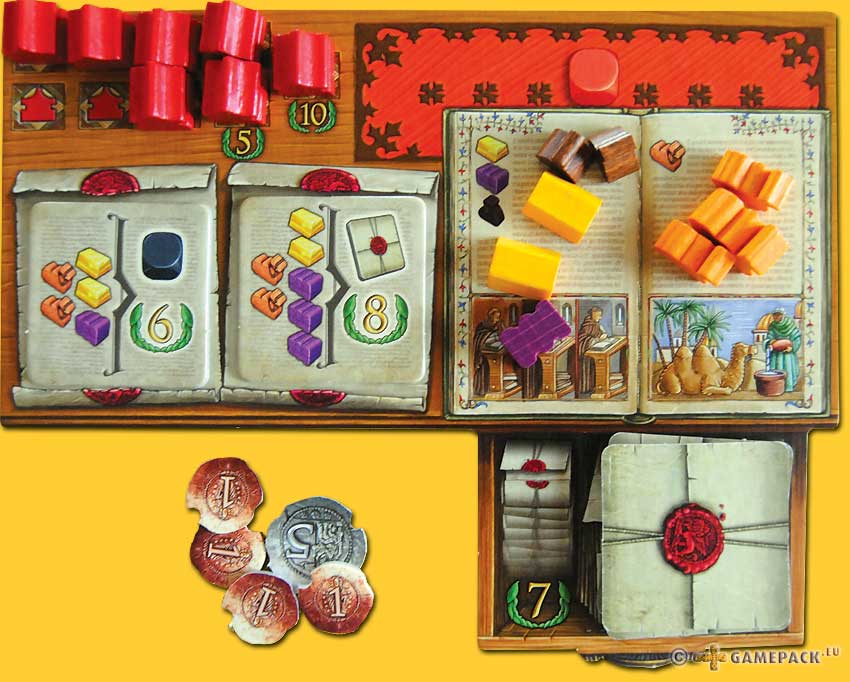 |
|
| x |
|
|
|
|
|
|
|
|
|
|
|
|
|
|
|
|
|
|
|
|
|
|
|
|
|
|
|
|
|
|
|
|
|
|
|
|
|
|
|
|
|
|
|
|
|
|
|
|
|
|
|
|
|
|
|
|
|
|
|
|
|
|
These actions already reveal the flow of the game: take goods/camels/money, fulfil contracts, earn points. But Marco Polo was a merchant traveller! It is therefore not at all surprising that in the homonymous game we can also do some travelling!
The board depicts a map of the Orient, where small towns and large cities are connected by roads. If a player travels along the roads with his merchant, he may place a trading post in all towns and cities where he ends his movement. The small towns yield income for each coming round (in camels, goods or money), the large cities contain action-locations that can be used only by the players who have built a trading post in that city. These actions make the players more flexible: exchange money/goods/camels/victory points, receive victory points per fulfilled contract, travel for free, et cetera. 31 City cards are provided, while only 9 of them are used in the game, so each game the cards and their distribution over the board is bound to be very different! |
|
|
|
| x |
|
|
|
|
|
|
|
|
|
|
|
|
|
|
|
|
|
|
|
|
|
|
|
|
|
|
|
|
|
|
|
|
|
|
|
|
|
|
|
|
|
|
|
|
|
|
|
|
|
|
|
|
|
|
|
|
|
|
|
|
|
|
 |
|
|
|
|
|
|
|
|
|
|
|
|
|
|
|
|
|
|
|
|
|
|
|
|
|
|
|
|
|
|
|
|
|
|
|
|
|
|
|
|
|
|
|
|
|
|
|
|
|
|
|
|
|
|
|
|
|
|
|
|
|
|
|
|
| But traveling is not cheap, not today and not in the days of Marco Polo. In order to travel, a player places two dice on the travel-field. He may move as many spaces as the number on the lowest die, and he pays three (1 step) to 18 (6 steps) coins for this. Additionally, he has to pay toll (coins or camels) for many of the routes, as depicted on the map. All things taken together, this travelling business is not that attractive… |
|
|
|
| xx |
|
|
|
|
|
|
|
|
|
|
|
|
|
|
|
|
|
|
|
|
|
|
|
|
|
|
|
|
|
|
|
|
|
|
|
|
|
|
|
|
|
|
|
|
|
|
|
|
|
|
|
|
|
|
|
|
|
|
|
|
|
|
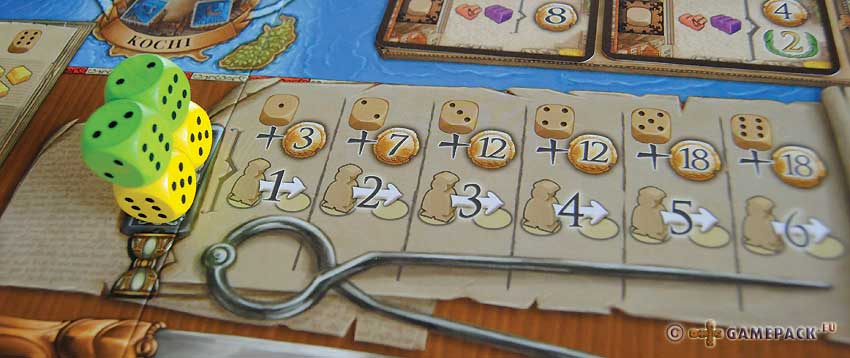 |
|
| x |
|
|
|
|
|
|
|
|
|
|
|
|
|
|
|
|
|
|
|
|
|
|
|
|
|
|
|
|
|
|
|
|
|
|
|
|
|
|
|
|
|
|
|
|
|
|
|
|
|
|
|
|
|
|
|
|
|
|
|
|
|
|
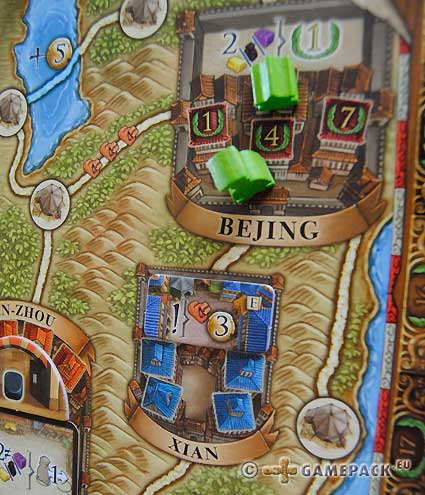 |
That’s why we have been provided with some additional incentives: first of all, bonus points are awarded for all players who manage to reach Beijing. Second, each player receives two objective cards, each of them depicting two cities. At the end of the game, bonus points are awarded for players who have built a trading post in some or all of their objective cities. Also, 5 and 10 bonus points are awarded upon building your 8th or 9th trading post, respectively. |
|
|
|
| x |
|
|
|
|
|
|
|
|
|
|
|
|
|
|
|
|
|
|
|
|
|
|
|
|
|
|
|
|
|
|
|
|
|
|
|
|
|
|
|
|
|
|
|
|
|
|
|
|
|
|
|
|
|
|
|
|
|
|
|
|
|
|
 |
|
| x |
|
|
|
|
|
|
|
|
|
|
|
|
|
|
|
|
|
|
|
|
|
|
|
|
|
|
|
|
|
|
|
|
|
|
|
|
|
|
|
|
|
|
|
|
|
|
|
|
|
|
|
|
|
|
|
|
|
|
|
|
|
|
| In addition to the actions available on the board, players are allowed to carry out ‘additional actions’ as often as they like. For example, at the expense of a camel, a player may re-roll one of his dice. For two camels per number, he may also upgrade/downgrade a die. And for three camels, he may take a black die; this die is at his disposal for remainder of the round. At the end of the round, all black dice go back to the supply. |
|
|
|
| x |
|
|
|
| x |
|
|
|
| x |
|
|
|
 |
|
|
|
|
|
|
|
|
|
|
|
|
|
|
|
|
|
|
|
|
|
|
|
|
|
|
|
|
|
|
|
|
|
|
|
|
|
|
|
|
|
|
|
|
|
|
|
|
|
|
|
|
|
| Marco Polo is a very successful game. It offers variation, challenge and depth. The players may choose a character card at the beginning of the game; each character has a very distinct property that can help a player to select his objective cards and design his overall strategy. This way, everybody is ‘in control’. Of course the players depend on their die-roll. But the game offers ample opportunity to compensate a bad roll. Players may take camels or coins in compensation for a particularly bad roll, and these camels can be used to re-roll or to adjust the dice. Also, for some locations the number on the die is not so important, and in some cases a low roll is even better than a high one. |
|
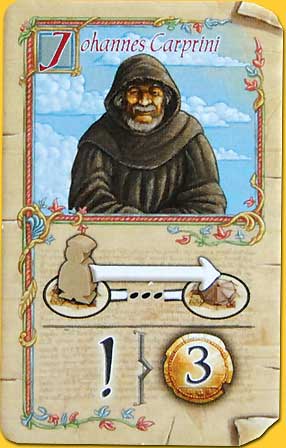 |
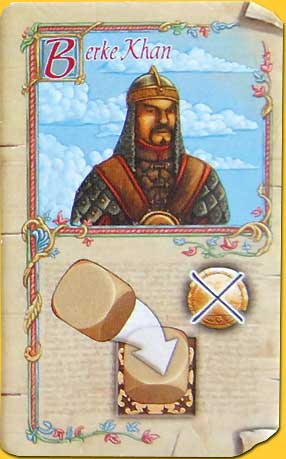 |
| x |
|
|
|
|
|
|
|
|
|
|
|
|
|
|
|
|
|
|
|
|
|
|
|
|
|
|
|
|
|
|
|
|
|
|
|
|
|
|
|
|
|
|
|
|
|
|
|
|
|
|
|
|
|
|
|
|
|
|
|
|
|
|
Players are also dependent on their opponents’ choices. It is always annoying if you wanted to collect silk, and the player before you decides to occupy the silk-position… Luckily, you are free to join him, as long as you pay for it. Actually, there’s almost nothing bad that can happen which can’t be compensated with money or camels. In conclusion: make sure you always have enough money and camels!!
There are two main strategies: the contracts on one side, and travelling on the other side. Travelling is very expensive. To visit all four objective-cities plus Beijing is very hard, sometimes even impossible. And five rounds is very very short… It sounds attractive to just stay in Venezia and concentrate on the contracts. Some contracts allow a free-travel-action as a reward; this way, even the explorers who are not so much inclined to travel can visit one or two cities and benefit from the bonuses and options. But thematically, it doesn’t feel well to re-live the voyages of Marco Polo without leaving your home town! |
|
|
|
| x |
|
|
|
|
|
|
|
|
|
|
|
|
|
|
|
|
|
|
|
|
|
|
|
|
|
|
|
|
|
|
|
|
|
|
|
|
|
|
|
|
|
|
|
|
|
|
|
|
|
|
|
|
|
|
|
|
|
|
|
|
|
|
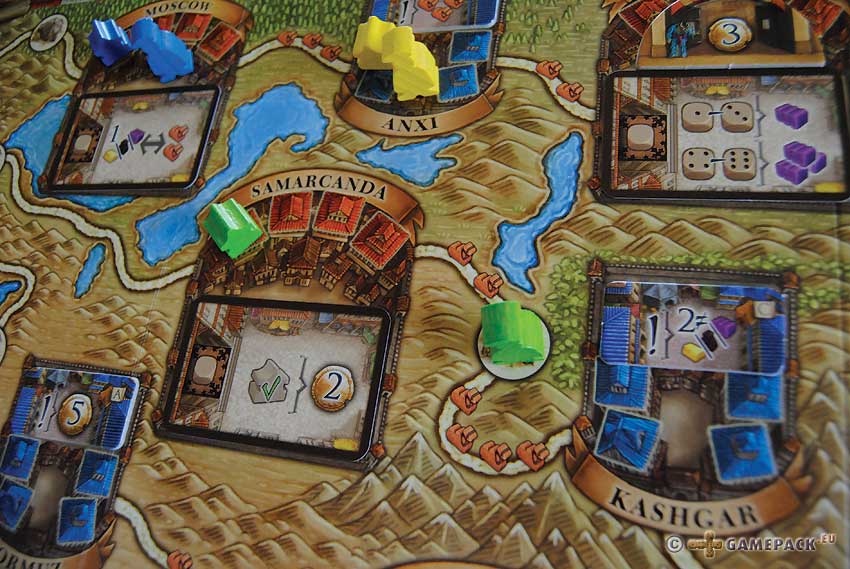 |
|
| x |
|
|
|
|
|
|
|
|
|
|
|
|
|
|
|
|
|
|
|
|
|
|
|
|
|
|
|
|
|
|
|
|
|
|
|
|
|
|
|
|
|
|
|
|
|
|
|
|
|
|
|
|
|
|
|
|
|
|
|
|
|
|
Furthermore, if you don’t visit any of the four objective cities nor Beijing, you miss out on a lot of points compared to players who do have their travelling-affairs in order. And the large city actions, only available to those with a trading post in that city, provide the players with many new possibilities; you don’t want to miss out on all of that! Your best option is to find a balanced mix of some strategic travelling combined with fulfilling contracts. The good thing about Marco Polo is that the game seems to invite you to try something different each time!
© 2015 Barbara van Vugt
Marco Polo, Daniele Tascini & Simone Luciani, 999 Games/Hans im Glück, 2015 - 2 to 4 players, 12 years and up, 20 minutes/player
|
|
|
|
  |
|
|
|
|
|
|
|
|
|
|
|
|
|
|
|
|
|
|
|
|
|
|
|
|
|
|
|
|
|
|
|
|
|
|
|
|
|
|
|
|
|
|
|
|
|
|
|
|
|
|
|
|
|
  |
|
  |
Something bothers me with this game, but I don't know what. Is it the discrepancy between travelling and fulfilling assignments? I'm still figuring out... |
  |
|
|
|
|
|
|
|
|
|
|
|
|
|
|
|
|
|
|
|
|
|
|
|
|
|
|
|
|
|
|
|
|
|
|
|
|
|
|
|
|
|
|
|
|
|
|
|
|
|
|
|
|
|
  |
|
|
|
|
|
|
|
|
|
|
|
|
|
|
|
|
|
|
|
|
|
|
|
|
|
|
|
|
|
|
|
|
|
|
|
|
|
|
|
|
|
|
|
|
|
|
|
|
|
|
|
|
|
| x |
|
|
|
|
|
|
|
|
|
|
|
|
|
|
|
|
|
|
|
|
|
|
|
|
|
|
|
|
|
|
|
|
|
|
|
|
|
|
|
|
|
|
|
|
|
|
|
|
|
|
|
|
|
|
|
|
|
|
|
|
|
|
| x |
|
|
|
|
|
|
|
|
|
|
|
|
|
|
|
|
|
|
|
|
|
|
|
|
|
|
|
|
|
|
|
|
|
|
|
|
|
|
|
|
|
|
|
|
|
|
|
|
|
|
|
|
|
|
|
|
|
|
|
|
|
|
 |
|
|
|
|
|
|
|
|
|
|
|
|
|
|
|
|
|
|
|
|
|
|
|
|
|
|
|
|
|
|
|
|
|
|
|
|
|
|
|
|
|
|
|
|
|
|
|
|
|
|
|
|
|
 |
|
|
|
|
|
|
|
|
|
|
|
|
|
|
|
|
|
|
|
|
|
|
|
|
|
|
|
|
|
|
|
|
|
|
|
|
|
|
|
|
|
|
|
|
|
|
|
|
|
|
|
|
|
| x |
|
|
|
|
|
|
|
|
|
|
|
|
|
|
|
|
|
|
|
|
|
|
|
|
|
|
|
|
|
|
|
|
|
|
|
|
|
|
|
|
|
|
|
|
|
|
|
|
|
|
|
|
|
|
|
|
|
|
|
|
|
|
 |
|
|
|
|
|
|
|
|
|
|
|
|
|
|
|
|
|
|
|
|
|
|
|
|
|
|
|
|
|
|
|
|
|
|
|
|
|
|
|
|
|
|
|
 |
|
|
|
|
|
|
|
|
|
|
|
|
|
|
|
|
|
|
|
|
|
|
|
|
|
|
|
|
|
|
|
|
|
|
|
|
|
|
|
|
|
|
|
|
|